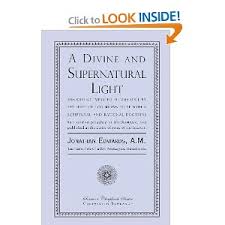…Immediately Imparted to the Soul by the Spirit of God, Shown to be both a Scriptural and Rational Doctrine by Jonathan Edwards

Tasting that Honey is Sweet – a sense of the loveliness and beauty of God
I was primarily alerted to this sermon through John Piper’s God Is the Gospel, which makes reference to this work several times. It is a sermon preached in 1734 on Matthew 16:17 “Blessed art thou Simon Bar-Jona: for flesh and blood hath not revealed it unto thee, but my Father which is in heaven.” It can also be found in Works of Jonathan Edwards, Vol. 2
In the sermon, Edwards explains what he means by “divine and supernatural light.” It is not those things that man may understand naturally by his conscience or a sense of the wickedness of sin. Nor is it impressions made upon the imagination like “a visible lustre or brightness of any object.” It is not a discovery of any new truths not found in the word of God. Nor is it just being inwardly affected by religious things. This last point is made powerfully as he explains how a man can be affected by the sufferings of Jesus Christ “as by any other tragical story.” And even more so simply because of the “interest he conceives mankind to have in it.” Man can be affected with the ideas of heaven, as well as by “a romantic description of the pleasantness of fairy land.”
Divine and spiritual light, rather, is “a real sense and apprehension of the divine excellency of things revealed in the word of God… He does not merely rationally believe that God is glorious, but he has a sense of the gloriousness of God in his heart. There is not only a rational belief that God is holy, and that holiness is a good thing, but a sense of how amiable God is on account of the beauty of this divine attribute.” God made us capable of knowing in two distinct ways: “First, that which is merely notional… the other is, that which consists in the sense of the heart; as when the heart is sensible of pleasure and delight in the presence of the idea of it.” “There is a difference between having an opinion, that God is holy and gracious, and having a sense of the loveliness and beauty of that holiness and grace.”
He explains that seeing this beauty causes a conviction of the truth of to arise, and puts in words what I have experienced, but have never been able to describe so well: “They believe the doctrines of God’s word to be divine, because they see a divine, and transcendent, and most evidently distinguishing glory in them; such a glory as, if clearly seen, does not leave room to doubt of their being of God, and not of men.”
He explains that this light is given immediately to the soul by God, not mediated through other means, thought other means may accompany it. For instance, the word of God “conveys to our minds these doctrines; it is the cause of a notion of them in our heads, but not of the sense of their divine excellency in our hearts.” That sense of divine excellency is given immediately, directly from God Himself.
“Reason’s work is to perceive truth and not excellency. It is not ratiocination that gives men the perception of the beauty and amiableness of a countenance, though it may be many ways indirectly an advantage to it; yet it is no more reason that immediately perceives it, than it is reason that perceives the sweetness of honey: it depends on the sense of the heart, – Reason may determine that a countenance is beautiful to others, it may determine that honey is sweet to others; but it will never give me a perception of sweetness.”
He proves his points from scripture, and from reason, and then offers an “improvement” on the doctrine, aka “application.” 1. Reflect on the goodness of God! 2. Examine ourselves, and see “whether we have ever had this divine light let into our souls.” 3. Earnestly seek this spiritual light.
“The least glimpse of the glory of God in the face of Christ doth more exalt and ennoble the soul, than all the knowledge of those that have the greatest speculative understanding in divinity without grace.”
Amen, and amen. I highly recommend this sermon as a meditation on the revelation of the beauty of truth to the soul by the Spirit of God.




